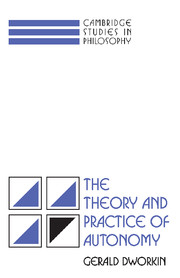Summary
There are those who know from the start where they are going and those who only realize after the journey where they have been traveling. I am one of the latter. I wrote about issues, problems, theses, as they occurred to me, as they provoked or baffled me, seriatim. My Ph.D. thesis was on the nature and justification of coercion, and two of my earliest publications were based on that work. In one I considered why those who choose under coercive pressures should not be considered to be acting freely (in spite of the fact that they would prefer to choose as they do, given their circumstances). In the other I considered the kinds of interferences with people justified by reference to their own good and when, if ever, such interferences might be justified. In both cases I was dealing with the choices people make and the significance and value of their making those choices in accordance with their own standards and preferences. I had embarked, without being aware of it, on a voyage circling that territory which I later came to think of as “autonomy.”
My first actual use of the term was in an essay in applied ethics. It was written at a time when there was much concern about issues such as psychosurgery, aversive conditioning, subliminal advertising, and drug therapy. I was asked by the Hastings Center to participate in a working group considering the ethics of various ways of influencing persons and their behavior.
- Type
- Chapter
- Information
- The Theory and Practice of Autonomy , pp. ix - xiiPublisher: Cambridge University PressPrint publication year: 1988



